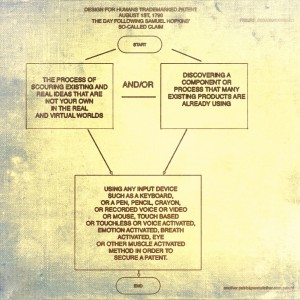Not too long ago I was engaging with my academic colleague and professional clown (some of the more witless from my former business lives might ask “is there a difference?”) Patrick Pennefather (http://thecdm.ca/people/faculty/patrick-pennefather).
Our topic of choice, as it frequently is, was the inadequacies of intellectual property as a concept, and how those inadequacies are magnified by the uncertainties inherent in legal definitional processes. Patrick, using his company name ‘Design for Humans’, then created the following rather telling diagram for a “patent process claim” to make his point:
A particularly surreal quality of our ensuing email dialogue (which of course also went directly to proving Patrick’s point) emerged when I proposed removing certain logos included in his original work so that the diagram could be publicly posted. Here is how that went:
Jon: “…Just to be safe, can you send me a version with the logos removed?…”
Patrick: “…I can send you without logos but then it’s no longer art:)”
Jon (trying in vain to be witty): “Who is Art?”
Patrick: “art is a friend i once knew currently lost on an island of doubt”
Boom.
Pretty well says it all on the subject of legal confusion undermining the creative process…
jon
P.S. Patrick’s blog, suitably titled “The Unknown Collaborative Zone” is at http://unknownzone.patrickpennefather.com/


 Follow
Follow